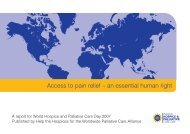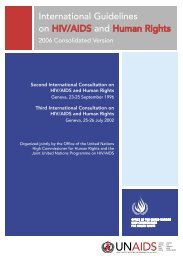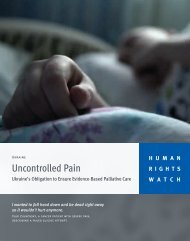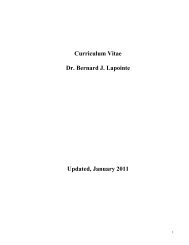INTERIGHTS Bulletin
INTERIGHTS Bulletin
INTERIGHTS Bulletin
Create successful ePaper yourself
Turn your PDF publications into a flip-book with our unique Google optimized e-Paper software.
<strong>INTERIGHTS</strong> <strong>Bulletin</strong><br />
Volume 16 Number 4 2011<br />
183<br />
Governments also have an obligation<br />
to take measures to protect people<br />
under their jurisdiction from inhuman<br />
and degrading treatment. Failure of<br />
governments to take reasonable<br />
measures to ensure accessibility of<br />
pain treatment, which leaves millions<br />
of people to suffer needlessly from<br />
severe and often prolonged pain, raises<br />
questions whether they have<br />
adequately discharged this<br />
obligation. 34<br />
The European Court of Human Rights<br />
has held that vulnerable individuals,<br />
such as children, are particularly<br />
entitled to state protection. 35 In an<br />
authoritative interpretation of the<br />
Convention against Torture, the<br />
Committee against Torture specifically<br />
cites the protection of ‘marginalized<br />
individuals or populations’ against<br />
torture or ill-treatment as an obligation<br />
for state parties and identifies health<br />
status as a category for vulnerability. 36<br />
A strong case can be made for<br />
considering patients with incurable<br />
illnesses vulnerable individuals as<br />
well.<br />
So what are the reasonable steps a<br />
government should take to protect<br />
patients with severe pain from<br />
unnecessary suffering We can look<br />
for guidance at the right to health. A<br />
key duty under the right to health is the<br />
obligation to respect which requires<br />
countries to ‘refrain from interfering<br />
directly or indirectly with the<br />
enjoyment of the right to health.’ 37 In<br />
Artur’s case, Ukraine’s drug control<br />
policies made it practically impossible<br />
for healthcare workers to properly<br />
manage his pain. As the legal<br />
requirement that a healthcare worker<br />
administer every dose of morphine is<br />
unnecessary from both a medical and<br />
drug control perspective – it is<br />
standard practice worldwide that<br />
patients who are at home or their<br />
families administer morphine<br />
themselves – there is no justification<br />
for a regulation that so severely<br />
impedes appropriate pain care, which<br />
thus violates the obligation to respect.<br />
Another example: In Guatemala, drug<br />
control regulations require that every<br />
prescription for morphine be validated<br />
at a government office in Guatemala<br />
City before a pharmacy can fill it. This<br />
requirement, again unnecessary from<br />
a drug control or medical perspective,<br />
for all practical purposes makes<br />
morphine inaccessible for many<br />
patients, particularly those in rural<br />
areas.<br />
The Committee on Economic, Social<br />
and Cultural Rights, the body that<br />
monitors the implementation of the<br />
right to health as articulated in the<br />
International Covenant on Economic,<br />
Social and Cultural Rights<br />
(ICESCR), 38 has identified a number<br />
of core obligations under the right to<br />
health, which it holds all countries<br />
must meet regardless of resource<br />
availability. First, the Committee<br />
articulates the general principle that<br />
‘the right of access to health facilities,<br />
goods and services on a nondiscriminatory<br />
basis, especially for<br />
vulnerable or marginalized groups’. 39<br />
A crucial core obligation for this topic<br />
holds that states must ensure the<br />
availability and accessibility of<br />
medications included in the WHO<br />
Model List of Essential Medicines,<br />
which includes morphine. In fact,<br />
countries also have an obligation to<br />
ensure the availability of morphine<br />
under the 1961 Single Convention on<br />
Narcotic Drugs, to which 184 countries<br />
are party and which ‘establishes a dual<br />
drug control obligation: to ensure<br />
adequate availability of narcotic drugs,<br />
including opiates, for medical and<br />
scientific purposes, while at the same<br />
time preventing illicit production of,<br />
trafficking in and use of such<br />
drugs.’ 40 Thus, ensuring the<br />
accessibility of morphine is not just a<br />
reasonable step toward preventing<br />
unnecessary suffering from pain, it<br />
actually is a legal obligation.<br />
A second core obligation holds that<br />
states must adopt and implement a<br />
national public health strategy and<br />
plan of action. 41 This core obligation is<br />
closely aligned with a recommendation<br />
by the WHO that countries adopt<br />
national or state policies that support<br />
pain relief and palliative care. 42 A<br />
second reasonable step to prevent<br />
unnecessary suffering from pain is<br />
therefore the adoption of health<br />
policies that address the palliative care<br />
needs of the population. If national<br />
health policies fail to do so, the state<br />
will fall foul of this core obligation.<br />
Finally, the Committee has held that<br />
providing appropriate training for<br />
health personnel is an obligation of<br />
‘comparable priority.’ 43 Again, this<br />
obligation coincides with WHO’s<br />
recommendation that countries ensure<br />
healthcare workers are trained in<br />
provision of palliative care. 44 Thus, a<br />
third reasonable step toward<br />
preventing unnecessary suffering from<br />
pain therefore involves ensuring that<br />
healthcare personnel, particularly<br />
those likely to regularly encounter<br />
patients who need such health<br />
services, such as oncologists, have at<br />
least basic training in palliative care<br />
provision.<br />
When the failure of states to take these<br />
positive steps or to refrain from<br />
interfering with healthcare services<br />
condemn large number of patients to<br />
unnecessary suffering from pain, they<br />
will not only fall foul of the right to<br />
health but may also violate the positive<br />
obligation under the prohibition of<br />
torture and ill-treatment. In an<br />
example of this in India we found that<br />
more than half of the country’s<br />
regional cancer centres, which see tens<br />
of thousands of cancer patients per<br />
year, do not offer adequate palliative<br />
care services. In fact, many do not even<br />
have morphine or doctors trained in<br />
using it, despite the fact that 70 per<br />
cent or more of their patients have<br />
advanced cancer and are likely to<br />
require pain treatment. Although the<br />
Indian government bestows the<br />
prestigious designation of regional<br />
cancer centre on hospitals and<br />
provides some financial support, it has<br />
not used its leverage with these<br />
hospitals to ensure that they offer<br />
palliative care and pain treatment<br />
services. As a result, tens of thousands<br />
of patients of these cancer centres<br />
suffer unnecessarily from severe pain<br />
every year. A doctor at a regional cancer
















